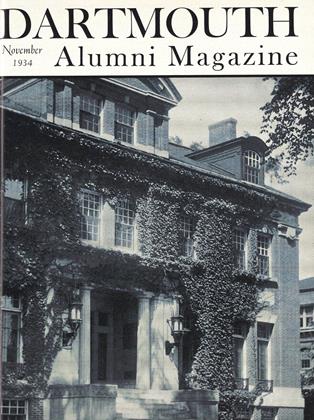On the night of October 13, the third Saturday after the opening of College, 496 sophomores pledged fraternities the largest number in the history of the College. Following a highly concentrated three weeks' rushing period (concentrated because the new rules permit no rushing during the freshman year) pledge night was climaxed by as riotous an entertainment as has been seen on the Hanover campus in many years. Dick's House received its quota of patients the next day, and Chief Hallisey of the Hanover police force began drawing up an itemized bill of $125 to present to the Interfraternity Council for damage done to town property.
One can, however, hardly draw from large numbers and successful celebrations any conclusions of increasing spirit of brotherhood among the Greeks of Hanover, for all other indications show a definite trend in the opposite direction. There is no doubt that fraternity life at Dartmouth is at present in an unstable condition that is due for a radical change, and that time for such change is not far distant. Whether the growing tendency points towards the severance of the local chapters' connections with their national organizations and the forming of purely local clubs, whether it will mean the complete abolition of fraternities at Dartmouth, or whether the Greek spirit of brotherhood will revitalize itself on the ideals of former years, it is difficult now to tell, but it hardly seems that the latter of these courses is probable.
Student Managers George F. Colton '35 of Springfield, Mass. (in D sweater), is manager of football. Bob Morris '36 of La Jolla, Calif., son of Robert S. Morris '12, is assistant manager.
 View Full Issue
View Full Issue
More From This Issue
-
 Article
ArticleGRADUS AD PAMPASSUM
November 1934 By The Editors -
 Article
ArticleHANOVER BROWSING
November 1934 By Herbert F. West '22 -
 Class Notes
Class NotesClass of 1930
November 1934 By Albert I. Dickerson -
 Class Notes
Class NotesClass of 1934
November 1934 By Martin J. Dwyer Jr. -
 Class Notes
Class NotesClass of 1929
November 1934 By F. William Andres -
 Class Notes
Class NotesClass of 1914
November 1934 By Edward Leech
Milburn McCarty IV '35
-
 Article
ArticleSMALL HOUSES CLAIM UNITY
November 1934 By Milburn McCarty IV '35 -
 Article
ArticleDORMS COME OF AGE
November 1934 By Milburn McCarty IV '35 -
 Article
ArticleSUCCESSFUL HOUSE PARTIES
December 1934 By Milburn McCarty IV '35 -
 Article
ArticleTHE UNDERGRADUATE CHAIR
February 1935 By Milburn McCarty IV '35 -
 Article
ArticleSTUDENT CONTROL
April1935 By Milburn McCarty IV '35 -
 Article
ArticleWEEK-ENDING
April1935 By Milburn McCarty IV '35
Article
-
 Article
Article"DARTMOUTH OUT O' DOORS"
-
 Article
ArticleGIFTS TO THE COLLEGE DURING THE PAST YEAR
August 1917 -
 Article
ArticleBEQUEST FROM BENJAMIN A. KIMBALL '54
November 1920 -
 Article
ArticlePROFESSOR FOSTER'S ARTICLE APPEARS AS COLLEGE REPRINT
February, 1924 -
 Article
ArticleFall Council Meeting
December 1934 -
 Article
ArticleMEETING THE PROBLEM OF COLLEGE ATHLETICS
June, 1911 By W. Huston Lillard 1905

